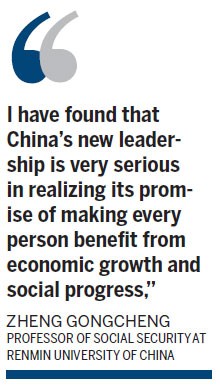Target date of 2020 set for 'fair and unified' welfare system
Updated: 2013-03-14 07:03
By Fu Jing (China Daily)
|
||||||||

China's new leaders aim to establish a "fair and unified" social security system by 2020, according to a senior lawmaker and scholar.
This will meet increasing public needs for pensions and medical care, reduce the widening wealth gap and boost social cohesion, he said.
Zheng Gongcheng, a deputy to the National People's Congress who has been extensively involved in the design of China's social security system for years, said a sound social safety net is an essential part of the nation's goal of setting up a prosperous society by 2020.
"I have found that China's new leadership is very serious in realizing its promise of making every person benefit from economic growth and social progress," Zheng, professor of social security at Renmin University of China in Beijing, told China Daily in an exclusive interview.
Zheng said the central government will double its efforts to divert fiscal income into medical care, social security and basic housing in the years to come.
"From this year's draft budget plan, I have already sensed this trend," he said.
The new leadership began to play its role in November after the 18th National Congress of the Communist Party of China, and in the coming days the government reshuffle will be finalized.
In the draft budget plan to be voted on by NPC deputies, the government plans to spend 260 billion yuan ($41.9 billion) this year on medicare programs, up 27.1 percent from last year.
Spending on social security and employment spending would reach 655 billion yuan, up 13 percent from last year. The draft also earmarks 223 billion yuan for basic housing to improve living conditions for people on the lower rungs of society.
But Zheng said the ratio of social welfare spending to total fiscal revenue has stood at 15 percent.
"We are still at a very low level and need to increase this greatly and use public money smartly," he said.
Zheng said this ratio compares with 40 to 50 percent in some European countries. Even in the US, which emphasizes efficiency, the government has spent at least one-third of its income on basic public benefits, especially for medium- and low-income families.
"So China needs to strive hard so that the public benefits from its huge accumulation of public fiscal income," he said.
Zheng agreed with Premier Wen, who said in his final Government Work Report last week that China's social security undertakings have made a "historic breakthrough".
In explaining this achievement, Zheng said the biggest change centers on the mindset of China's decision-makers. "They have already taken social security as a necessary or essential part of a market economy, but they used to wrongly view it as a charitable deed," he said. "For me, this is a real breakthrough."
He added: "The Chinese government has reacted with unprecedented speed in the past decade in setting up a basic social security system."
Zheng also said that during the past decade the social security network has achieved unprecedented widespread cover - another breakthrough. The network has spread from urban to rural regions. Before 2006, farmers had to pay various taxes and social security payments. Now, the agricultural tax has been scrapped and farmers have gradually started to benefit from basic medicare, pensions and job training.
The government has announced it has set up a basic social security system, covering urban and rural residents. But Zheng said: "In spite of these achievements, we still have a lot of work to do."
Apart from increasing fiscal input, Zheng said businesses and individuals should increase their contributions to the pension, housing and medicare accounts.
He also said China should combine the rural and urban social security operations.
fujing@chinadaily.com.cn
(China Daily 03/14/2013 page5)

 In Photos: 7.0-magnitude quake hits Sichuan
In Photos: 7.0-magnitude quake hits Sichuan
 Li Na on Time cover, makes influential 100 list
Li Na on Time cover, makes influential 100 list
 FBI releases photos of 2 Boston bombings suspects
FBI releases photos of 2 Boston bombings suspects
 World's wackiest hairstyles
World's wackiest hairstyles
 Sandstorms strike Northwest China
Sandstorms strike Northwest China
 Never-seen photos of Madonna on display
Never-seen photos of Madonna on display
 H7N9 outbreak linked to waterfowl migration
H7N9 outbreak linked to waterfowl migration
 Dozens feared dead in Texas plant blast
Dozens feared dead in Texas plant blast
Most Viewed
Editor's Picks

|

|

|

|

|

|
Today's Top News
Live report: 7.0-magnitude quake hits Sichuan, heavy casualties feared
Boston suspect cornered on boat
Cross-talk artist helps to spread the word
'Green' awareness levels drop in Beijing
Palace Museum spruces up
First couple on Time's list of most influential
H7N9 flu transmission studied
Trading channels 'need to broaden'
US Weekly

|

|







